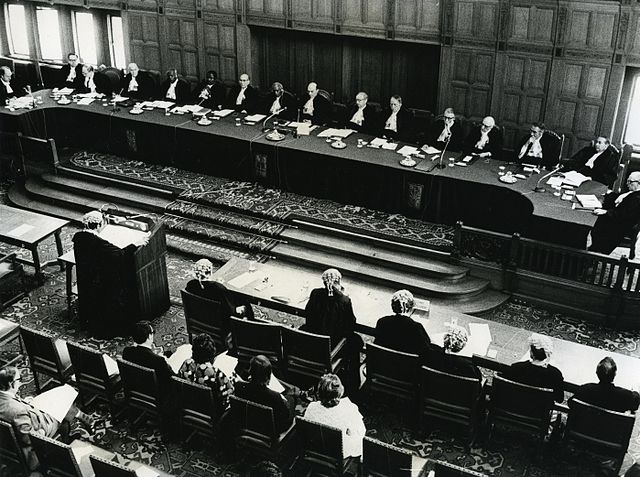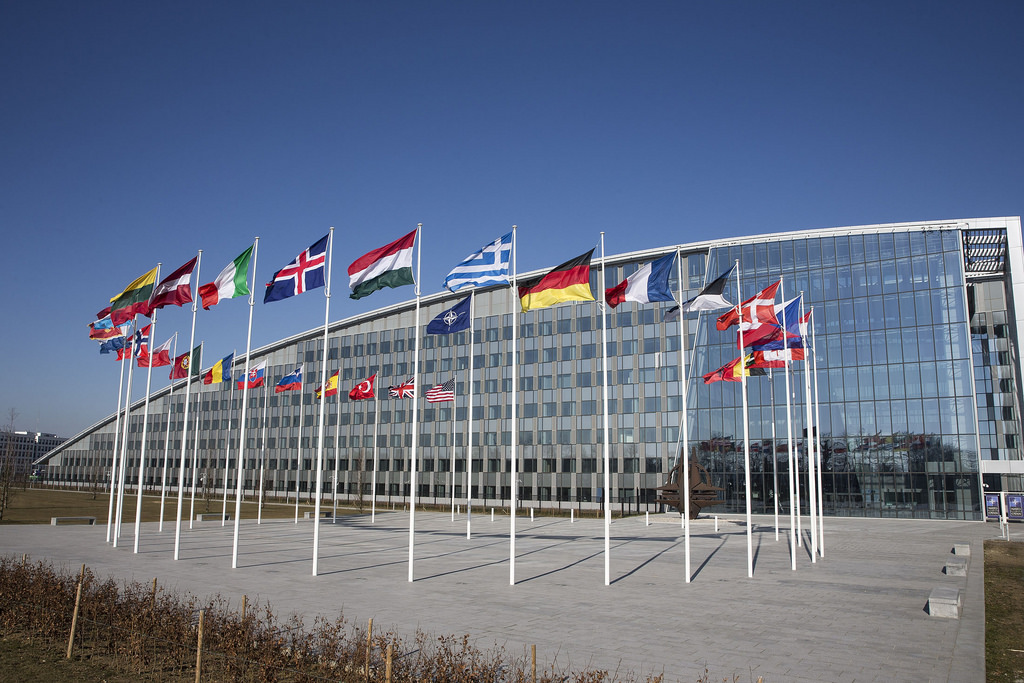Certain Iranian Assets: The International Court of Justice Splits the Difference Between the United States and Iran

On Feb. 13, the International Court of Justice (ICJ) handed down its decision on the U.S. preliminary objections in Certain Iranian Assets (Iran v. United States). Iran brought this case against the United States in 2016, after the U.S. Supreme Court’s decision in Bank Markazi v. Peterson. In Peterson, the court sanctioned the turnover of about $1.75 billion in Central Bank of Iran assets to satisfy U.S. court judgments in favor of terrorism victims under the Foreign Sovereign Immunities Act’s terrorism exception. Iran also challenged other U.S. measures, including President Barack Obama’s Executive Order 13599, which blocked all government of Iran assets within U.S. jurisdiction.
While the ICJ accepted jurisdiction over the case and allowed it to move forward—rejecting most U.S. preliminary objections—the United States won a key argument. The ICJ agreed with the U.S. that the court does not have jurisdiction to hear claims based on the international law of state immunity, thereby removing the weakest link in the U.S. legal position. The ruling significantly narrows the scope of the case and its implications for international law.
I previously wrote about the background to Certain Iranian Assets and Iran’s claims. As the basis for the ICJ’s jurisdiction, Iran invoked Article XXI.2 of the 1955 bilateral Treaty of Amity, Economic Relations, and Consular Rights between the United States and Iran. The treaty grants the ICJ jurisdiction over disputes concerning “the interpretation or the application” of the treaty that cannot be “satisfactorily adjusted by diplomacy.” Iran argues that the U.S. violated its commitments under various treaty provisions, as well as the international law of state immunity from jurisdiction and execution—which, according to Iran, the Treaty of Amity incorporates.
Recently, Iran relied on the treaty as the basis for the ICJ’s jurisdiction in another case it brought against the United States. That case, Alleged Violations of the 1955 Treaty of Amity, Economic Relations, and Consular Rights (Iran v. United States), challenges the U.S. decision to re-impose sanctions lifted in the framework of the Iran nuclear deal following the U.S. withdrawal from the agreement. In October 2018, the ICJ ruled that it had prima-facie jurisdiction to hear the nuclear sanctions case and indicated limited provisional measures in favor of Iran. In response to that ruling, the United States terminated the Treaty of Amity, but the termination will only come into effect next October 2019 under Article XXIII(3) of the treaty. As the ICJ noted in its Feb. 13 judgment, the U.S. withdrawal did not affect the Treaty of Amity’s applicability in the cases currently pending before the ICJ.
In the nuclear sanctions case, the ICJ held that the very fact that a question arises as to the interpretation of the Treaty of Amity is sufficient to grant the court jurisdiction. It also found that the scope of the national security exception in Article XX(1) of the treaty, which excludes national security action from its purview, is a question for the merits stage of the case.
The ICJ reached the same conclusions in its Certain Iranian Assets judgment. The United States raised three jurisdictional objections and two objections to the admissibility of the case. On jurisdiction, the U.S. argued that (1) under the Treaty of Amity’s national security exception, the treaty does not apply to U.S. actions pursuant to Executive Order 13599, because those actions were designed to counter Iran’s nuclear proliferation activities; (2) the court lacks jurisdiction over all claims grounded in the international law of state immunity; and (3) key treaty provisions that Iran relies upon do not apply to the Iranian government and the Central Bank of Iran, because the bank is a government instrumentality, while those treaty provisions refer to “nationals” or “companies” rather than government entities. The United States also argued that Iran’s abuse of process in relying on the Treaty of Amity and its unclean hands—given its own support for terrorism and proliferation activities, treatment of U.S. persons and property, as well as the state of the U.S.-Iran relationship—rendered the case inadmissible.
I previewed these arguments in my previous piece, observing that
Whether the relevant 1955 treaty provisions cover government agencies and instrumentalities like the Central Bank of Iran ultimately depends on how one interprets their language. As previously noted, the treaty grants the ICJ jurisdiction over any dispute between the parties regarding its interpretation, and therefore the mere fact that the case presents questions of interpretation could suffice for the ICJ to accept jurisdiction. Still, if the ICJ is persuaded that, as the U.S. government maintained in Peterson, the majority of the violations Iran alluded to in its application do not implicate the 1955 treaty, it might deny jurisdiction. Even if the ICJ accepts jurisdiction based on the provisions regarding commerce (X.1) or transfer of funds (VII.1), which are not limited to “companies” or “nationals,” it might take Article IV out of the mix. This would be important because Article IV “imports” international law into the treaty, significantly expanding the scope of the applicable legal norms.
The ICJ did not take Article IV of the Treaty of Amity out of the mix entirely, but it did interpret it narrowly. Contrary to Iran’s position, it found that Article IV does not incorporate the international law of state immunity into the treaty. Article IV guarantees the “most constant protection and security” for the property of one party’s nationals and companies in the territory of the other, “in no case less than that required by international law.” Based on the treaty’s object and purpose, discerned from its title, preamble and text, the court concluded that Article IV refers only to a minimum standard of protection for property similar to the standard typically required in investment treaties—not the law of state immunity. The court also rejected Iran’s claims that other treaty provisions incorporated the law of state immunity. It therefore upheld the U.S.’s second objection and held that it lacked jurisdiction to entertain claims based on the international law of state immunity.
The ICJ rejected the four other U.S. objections. As in the nuclear sanctions case, it found that the applicability of the national security exception of the Treaty of Amity is a matter for the merits stage of the case. It also declined to deny jurisdiction based on the U.S. interpretation that certain treaty provisions Iran relies upon do not apply to the Central Bank of Iran. It found that the treaty could apply to commercial—as opposed to sovereign—activity of the Central Bank of Iran, and that more facts are necessary to ascertain the nature of its activities in the U.S. This, too, the court concluded, was a question for the merits stage of the case. Finally, the court rejected the U.S. abuse of process and unclean hands objections.
Why is the court’s ruling on state immunity significant? Had the court accepted jurisdiction over claims arising from the international law of state immunity, the United States would be in a rather precarious legal position. As I wrote:
In the event that the ICJ eventually reaches the international law issues concerning state immunity through Article IV.2 of the 1955 treaty, the U.S. will likely face an uphill battle. If the 2012 ICJ decision in Jurisdictional Immunities of the State (Germany v. Italy, Greece intervening) is any indication, Iran has a fairly strong case arguing that the U.S. violated the international law of state immunity from enforcement measures. First, as a general matter, in Jurisdictional Immunities the ICJ exhibited resistance to recognizing new exceptions to immunity from jurisdiction under customary international law, even for cases involving grave human rights violations, violations of the law of armed conflict or violations of jus cogens. The court also observed that only the U.S. (at the time) recognized a terrorism exception to state immunity (para. 88). Turning to immunity from enforcement, the ICJ established that state immunity from post-judgment enforcement proceedings (or “measures of constraint”) is even broader than jurisdictional immunity: The court made clear that “the immunity from enforcement enjoyed by States in regard to their property situated on foreign territory goes further than the jurisdictional immunity enjoyed by those same States before foreign courts” (para. 113).
Furthermore, in its analysis of Germany’s immunity from enforcement, the court effectively relied on the relevant provisions of the 2004 U.N. Convention on Jurisdictional Immunities of States and Their Property (which the U.S. has not signed). This is interesting considering that the U.N. Convention has not yet entered into force, and that the court stopped short of determining that its enforcement-related provisions reflect customary international law in their entirety (para. 117). Seeing as the U.N. Convention explicitly provides that central banks enjoy immunity from post-judgment enforcement measures (see Articles 19 and 21(1)(c)), the ICJ’s references to the Convention do not bode well for the U.S.
Now all of this is off the table. The U.S. counterarguments concerning the interpretation of the treaty have better chances of success in the merits stage. Judging by the ICJ’s order indicating preliminary measures in the nuclear sanctions case, the U.S. is on more solid ground in arguing that Executive Order 13599 is covered by the Treaty of Amity’s national security exception. In finding that further evidence is necessary to ascertain the nature of the Central Bank of Iran’s activities to determine whether they are of a commercial or sovereign nature, the ICJ signaled that it is open to the U.S. argument regarding the treaty’s applicability to the Central Bank of Iran.
In its Feb. 13 judgment, then, the ICJ framed the Certain Iranian Assets case as a simple case about treaty interpretation. It significantly narrowed what could have been a major case on the international law of state immunity, which would likely have resulted in a rebuke of U.S. practice with respect to the terrorism exception under the Foreign Sovereign Immunities Act. At first glance, it would appear that the U.S. lost this round given the court’s rejection of all but one of its jurisdictional objections, but the judgment is in fact quite balanced. Iran was allowed to move forward with its treaty-based claims—but the U.S. escaped contending with a thorny legal issue. In response to the ruling, the State Department declared that “[t]his is a significant victory for the United States.”


.jpg?sfvrsn=407c2736_6)


